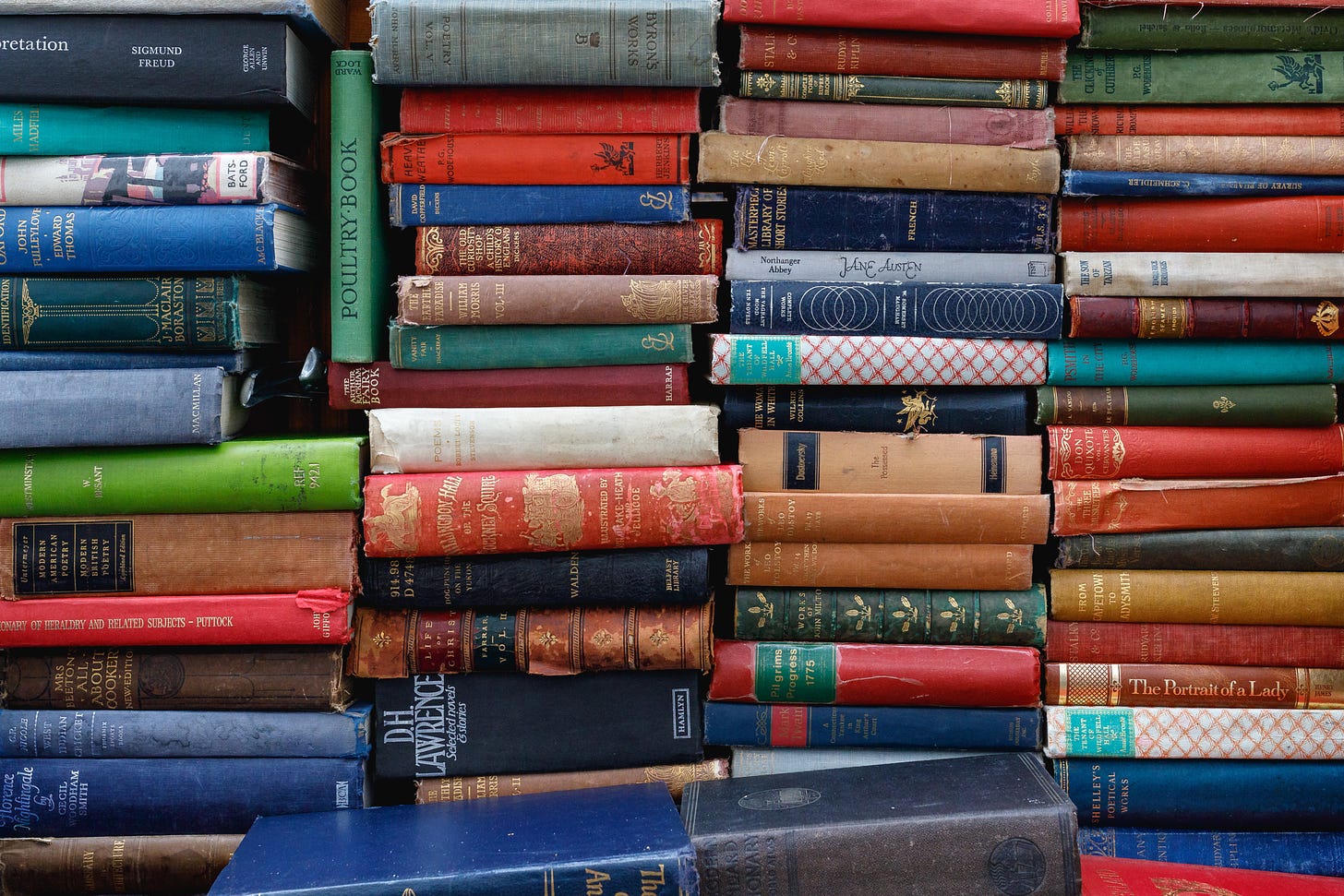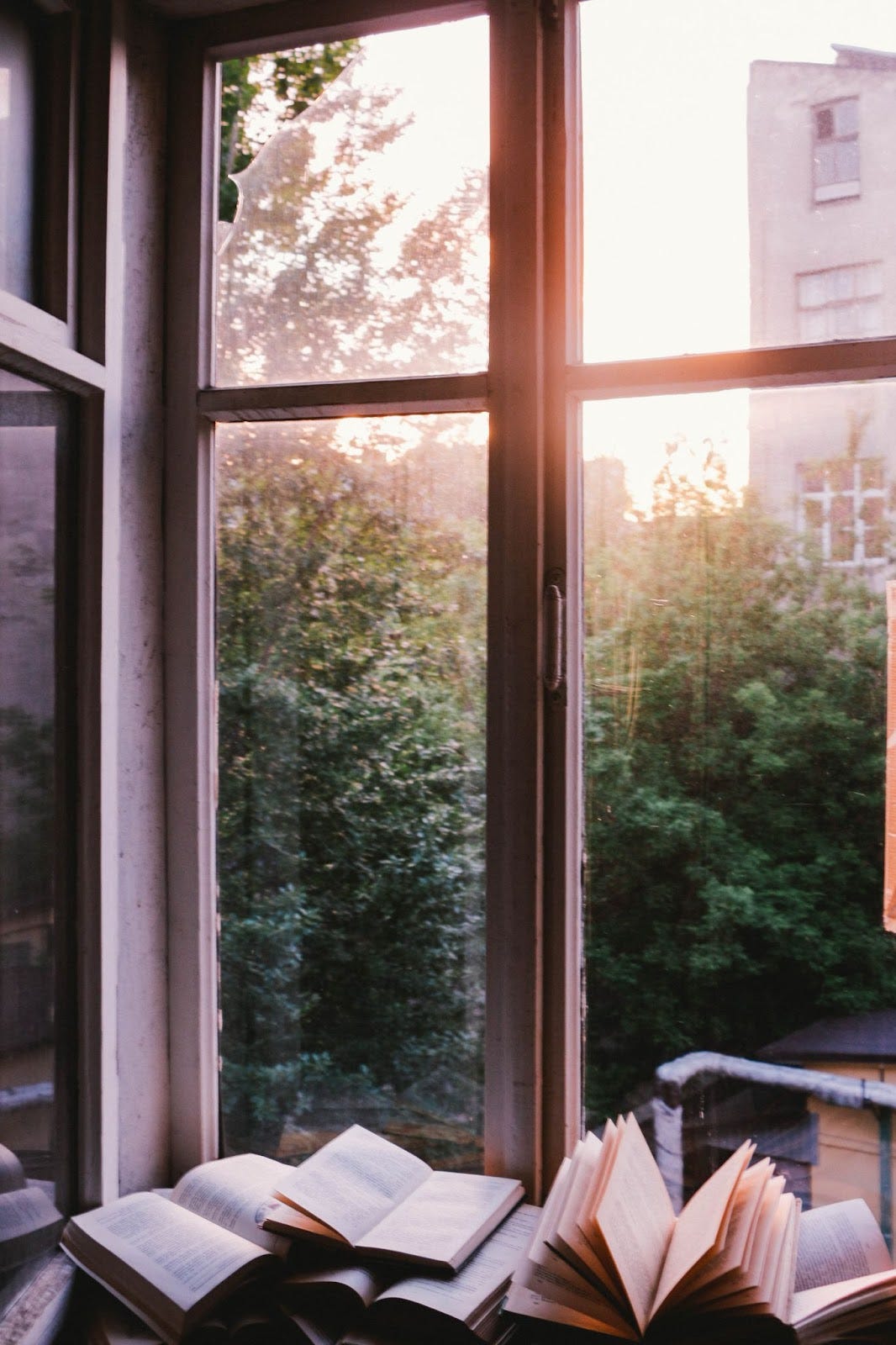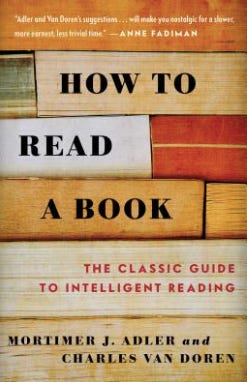“Right now I’m having amnesia and déjà vu at the same time. I think I’ve forgotten this before.” ― Steven Wright
Before we begin…
Think about all the books you’ve read. What are the ones you remember best and why? What do you do to help you remember what you’ve read?

Welcome! You’ve reached Spark. Learn more here or just read on. If you received this from a friend, please join us by subscribing. It’s free! All you have to do is press the button below. If you have already subscribed, welcome back! If you see something you like, hit that heart so others can find us more easily.
I read it, loved it, but I can’t remember why right now…
I think often about memory: how it works, how it doesn’t. Why, for example, can I remember the time when I was five years old stuffed into a pair of brown and white saddle shoes that I hated, and purposely marching into a puddle moments before my mother was about to take me to kindergarten? Why do I struggle to recall a book or a television show that I know I’ve read or watched?

I confess to being one of those people who has checked a book out of the library that I’ve already read. It doesn’t happen often, but it has happened. Which is probably why my husband recently shared with me an article by science writer Julie Beck, “Why We Forget Most of the Books We Read … and the movies and TV shows we watch” Today, I share it with you because I like to think I’m not the only one with this problem. Please confirm this or, if you have a compassionate bone in your body, lie and tell me your memory has, on occasion, failed you.
I struggle to retain the quotes, observations, or facts I found so fascinating even two days after closing the cover of a book I loved. I think that is one reason I like writing this newsletter – to share a book here, I must revisit it and find a way to capture it. Talking about a book helps to cement it in my memory.
“Surely some people can read a book or watch a movie once and retain the plot perfectly. But for many, the experience of consuming culture is like filling up a bathtub, soaking in it, and then watching the water run down the drain. It might leave a film in the tub, but the rest is gone.” - Julie Beck, Why We Forget Most of the Books We Read (and the movies and TV shows we watch)
She goes on to explain that as the Internet has grown, we rely on it for our memory. Why bother to memorize a quote when I can summon it from the Internet by clicking a few keys? Our “recall memory” – “the ability to spontaneously call information up in your mind” – is no longer as necessary. Another culprit: binging. I’m guilty of this. I tend to devour books. When I was a kid, I would check out my full limit and read each back to back to back. I still do this. The problem is, the more we shove into our brains without pause, the less it sticks. We are not noticing, or listening with the same attention.
Strategies and tools can help but mostly what seems to help is slowing down and reading a chapter or two at a time, pausing to think or maybe record some ideas. I keep meaning to do a better job of this but so far, I haven’t consistently managed it.
I was feeling a bit discouraged until I read this:
“Still, not all memories that wander are lost. Some of them may just be lurking, inaccessible, until the right cue pops them back up…” Julie Beck, Why We Forget Most of the Books We Read (and the movies and TV shows we watch)
When I look at the books on my shelves at home, some of which have been with me for decades, I may not recall a quote or two but I can instantly recall where I was when I read it for the first time, the period in my life, and other major events going on at the time. For example, I look at the well-thumbed copy of Bel Canto and remember how many times I picked it up at the bookstore before finally buying it only to resist reading it some more for a few more months. That period was one of distraction, new jobs, and no writing. I read lots of Robert Crais novels, or Michael Connelly. They were good and they entertained me, but they weren’t beautiful. They weren’t the kinds of books I hoped to write and feared I couldn’t.
Then one rainy Saturday I was alone and Bel Canto was the only book I hadn’t read in my apartment. I opened it up and then fell completely in love with it. Just thinking about it, I remember the scars on the face of the sad rebel leader who would rather have been teaching, the way Gen and the young woman he is falling in love with practice English in a closet full of china, the way one of the hostages takes over the cooking in the embassy kitchen, his wife’s blue scarf wrapped around his neck, and I remember the Swedish negotiator and the singing, and the soccer, and the joy and twin sense of hope and despair that colored every page. It made me want to reach higher.
Each book on my shelf has a story to go with it and these help me remember what was important to me about it. In the piece, Beck quotes Pamela Paul who wrote a book about the list of books she has kept since high school, her “book of books” or “Bob.” When she scans the list, she may not recall every detail of the contents of each book but the list itself has a story to tell.
“Bob offers immediate access to where I’ve been, psychologically and geographically, at any given moment in my life,”- Pamela Paul about her book My Life With Bob, a book she wrote about her book of books.
What about you?
Again, think about all the books you’ve read. What are the ones you remember best and why? What do you do to help you remember what you’ve read?
If you have trouble accessing the Atlantic article by Julie Beck, here is a link to a pdf version.
How to Read a Book (In Case You Don’t Know)
I didn’t know of How to Read A Book: The Classic Guide to Intelligent Reading until coming across it in an issue of Mental Pivot sent to me by The Sample. Honestly, the article struck me as dry and the book itself may prove a little too scholarly but I just bought a copy. It’s still in print after 60 years and was lauded by CNN’s Farheed Zakaria who says it “explains not just why we should read books, but how we should read them. It’s masterfully done.”
Then there were these blurbs from 1940 that both frightened and lured me in:
"There is the book; and here is your mind.' Adler and Van Doren's suggestions on how to connect the two will make you nostalgic for a slower, more earnest, less trivial time."--Anne Fadiman
"These four hundred pages are packed full of high matters which no one solicitous of the future of American culture can afford to overlook."--Jacques Barzun
"It shows concretely how the serious work of proper reading may be accomplished and how much it may yield in the way of instruction and delight."--The New Yorker
Resources for Readers and Writers
Here are two new links just added to our running list of resources for Readers and Writers. Know of something that can help another reader or writer find what they need? Share it and we will add it to our list!
Resources for Writers and Writers’ Groups
The Great Book of Journaling: How Journal Writing Can Support a Life of Wellness, Creativity, Meaning, and Purpose by Eric Maisel PhD (Editor), Lynda Monk MSW RSW CPCCby Lynda Monk and Eric Maisel is an anthology of essays by writers and journal-keepers that offer inspiration and support for journaling.
Resources for Readers & Book Clubs
Spark community member Rae F. offered this link that feels perfect for this week’s issue and has also been added to our list of Resources for Readers & Book Clubs. Use This Simple Technique to Get More Out of Every Book You Read, an article for readers who want to remember more about the book they just finished.
Welcome new subscribers!
Before signing off, I want to welcome all new subscribers. It’s thrilling to to find so many new folks on board each day. If you would like to check out past issues, here’s a quick link to the archives. Be sure to check out our Resources for Readers and Writers too.
No Spark Next Saturday
We’re taking July 2nd off to enjoy a little rest and a long summer weekend. We’ll be back on Saturday, July 9, in time for your morning coffee with a fresh edition of Spark. In the meantime, if you don’t want to go into withdrawals, here are the three posts that were read and liked the most in the past year for your re-reading (and remembering) pleasure:
Being A Little Less There: A Guest Essay by Tanya Ward Goodman
Bitter. Sweet. Alive: A Few Words About Chocolate… And some good stuff for readers and writers
That’s it for this week. Let me know your thoughts, dreams, how you are, and most of all what you are reading. Most of the books listed in this newsletter can or soon will be found at the Spark Community Recommendations page on bookshop.org where every sale supports local bookstores. Any commission we raise will support a literacy program selected by the community. I’ll update you soon on this.
Ciao for now,
Gratefully,
Betsy
P.S. And now, your moment of Zen…Attention, Shoppers
Sparkers Michelle and John K. thought they were discrimination shoppers when they were picking out flowers at Lowe’s not long ago but they spotted a far more discerning consumer along the way
Calling for Your Contribution to “Moment of Zen”
What is YOUR moment of Zen? Send me your photos, a video, a drawing, a song, a poem, or anything with a visual that moved you, thrilled you, calmed you. Or just cracked you up. This feature is wide open for your own personal interpretation.
Come on, go through your photos, your memories or just keep your eyes and ears to the ground and then share. Send your photos/links, etc. to me by replying to this email or simply by sending to: elizabethmarro@substack.com. The main guidelines are probably already obvious: don’t hurt anyone -- don’t send anything that violates the privacy of someone you love or even someone you hate, don’t send anything divisive, or aimed at disparaging others. Our Zen moments are to help us connect, to bond, to learn, to wonder, to share -- to escape the world for a little bit and return refreshed.
I can’t wait to see what you send!
And remember, If you like what you see or it resonates with you, please take a minute to click the heart ❤️ below - it helps more folks to find us!





I am one of many that can't remember most books I read not long after I close the book. The few books I do remember more things about are books that moved me in some way or are my 5 star reads. The upside of this is that I can re-read a book several years later and it seems like a new book. This has always been this way for me, it's not just a sign of getting older. :)
My reading and books are too sacred to stress over remembering them. Unless for school reading requirements, I give myself grace to forget. I think we are overloaded with information and our "file cabinet brains" are over stuffed and the drawers are jammed. Your writing is remembered by me just as being beautiful, truthful and worth reading. Hope that counts!